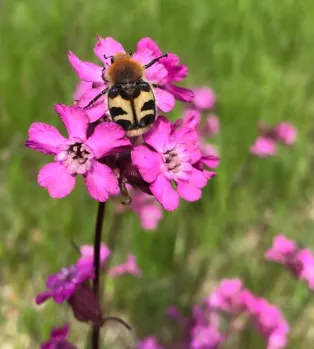The ERC Starting Grant is intended for early-career researchers and the only selection criterion is scientific excellence. After undergoing peer reviews and facing a high level of competition, the successful researchers and their projects have been ranked highest in Europe. This year, more than 3,400 researchers applied for the grant, of which 494 (22 in Sweden) received it.
Øystein Opedal, associate senior lecturer at the Department of Biology, is a PI in BECC and received the ERC for his project “POLLCLIM: Plant adaptation in a changing pollination climate”
What do you think stood out with your project, that awarded it with the ERC Grant?
I think the POLLCLIM project stood out in two main ways. First, the spatial and temporal scale of our field operations (50 study sites/populations, 5 years) is unusually large. This increases the probability of detecting those “rare” ecological events that drive evolutionary divergence, and that are often missed in studies of more typical size.
Second, we propose a theoretical framework embedded in established evolutionary theory, which is often missing in pollination studies and studies of pollinator-mediated floral evolution. We also build on the rather recent and encouraging insight that population divergence can often be predicted from microevolutionary parameters that we can measure in the field and greenhouse (natural selection, evolutionary potential). This recent insight clarifies and highlights the relevance of the work we proposed.
You were one of the researchers working on a BECC Action Group that resulted in the article “Evolutionary plant–pollinator responses to anthropogenic land-use change: impacts on ecosystem services”. Did that help you in any way preparing in your ERC application?
The work we did in the action group is certainly related, although with a more applied focus. Much of my thinking about land-use effects on pollination and floral evolution has been inspired by doing field work in southern Sweden as part of preparing for what is now the POLLCLIM ERC-project. Going forward, we already have ideas about additional work connecting the large-scale data to be collected during POLLCLIM back to land-use, hence closing the circle.
In what other way, if any, has being a member of BECC helped you in your efforts to receive the grant?
Lund is a great place to do science, not least working on evolutionary questions and questions related to pollination. Being part of BECC and the general Biology-CEC environment helps connecting my different interests (from pollination ecology in the field to evolutionary theory) through discussions with colleagues with different focus.
In what way, if any, could POLLCLIM help tackle the Grand Challenge identified by BECC regarding “Effective and biologically meaningful biodiversity conservation strategies across scales under global change”?
I sincerely think that pollination biology is an area where insights from fundamental science of the kind we do can be used to inform conservation policy and action. We have plans for a project focused on linking evolutionary processes to variation in landscape structure and land use, ultimately allowing us to predict the evolutionary consequences of specific management actions. Hopefully the funding agencies will agree it’s a good idea!
Learn more
Biologist receives ERC Starting Grant | Faculty of Science (lu.se)
Øystein Opedal — Lund University
Biodiversity under Global Change | BECC (lu.se)





